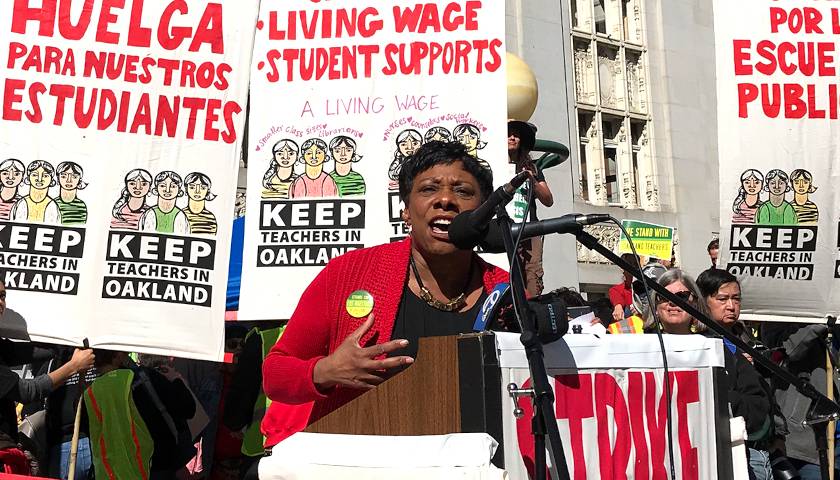by Dr. Carol M. Swain
Last week I wrote an opinion piece about why I support Diane Black for Governor of Tennessee. I explained that for weeks I have been telling people the only viable GOP gubernatorial choices for Christian conservatives were U.S. Representative Diane Black and business owner Bill Lee. My decision to choose Black over Lee has caused considerable angst among Lee supporters who are demanding an explanation. Focusing solely on Lee, I will outline the factors I considered while I was formulating my decision.
My decision to support Diane Black over Bill Lee has nothing to do with whether Lee is a good man or a good Christian. I have no reason to question his character or his faith. I am well aware of Lee’s dedication to organizations such as Men of Valor, which helps reintegrate former prisoners into society. I applaud him for his mission work and contributions to Middle Tennessee. Just like I did with Black, I took the time to read Lee’s book, although I was unsuccessful in my attempts to interview him about the book and how it has shaped his desire to serve in office.
Lee’s book, This Road I’m On: The Power of Hope in the Face of Adversity, tells the story of his family and the farm on which he was raised. It also goes into the Lee Plumbing and Electrical business he inherited and expanded, as well as the personal tragedies related to the accidental death of his first wife, the challenges of being a single father, and his courtship of and marriage to Maria. The book does not give any real insights into policy perspectives or how he might govern as the state’s chief executive. It does show him as a man raised in a hardworking farm family with values and principles that have sustained and undergirded his faith.
What this all boils down to, though, is that I cannot support Bill Lee for governor because he is not conservative enough to meet my standards nor is he the best-qualified GOP candidate in the gubernatorial race. He lacks the political knowledge and experience needed to serve as Tennessee’s chief executive. Because Lee has never served in public office, his actions and words are the only indicators of his values and principles. What we can glean from his actions would place him squarely in the liberal/moderate Christian category. The Tennessean reports that “While on the campaign trail, Lee has championed conservative values and touted the need for a Republican in office. . .voter records show that Lee, who first registered to vote in 1978, did not vote in a Republican primary election from 1996-2006.”
We also know from public records that he gave money to Democratic candidates. As the owner of Lee Company, Lee gave $1,000 to Phil Bredesen’s 2005 re-election bid against Republican Jim Bryson. Karl Dean, a Democrat, received a $250 campaign donation in his 2011 mayoral bid, and Megan Barry received $500 from Lee while successfully running for Nashville mayor, while her closest Republican challenger, David Fox, received nothing from Lee. (I received a $1000 contribution from Lee in 2018 during my mayoral bid. I also received a donation from Dave Black ($1,500).
When Lee gave money to Republicans, he favored establishment politicians that conservative Republicans labeled as RINOS (Republicans in name only), such as John McCain and Mitt Romney. Donald Trump received nothing from Lee in 2016. In addition to candidates, Lee’s contributions to liberal organizations include $5,000 given to Williamson Business PAC, a liberal organization that supported embattled school superintendent Mike Looney by helping to elect six liberal school board members supportive of Common Core.
Lee’s campaign spokesman has described Bill’s contributions as business-driven instead of ideologically motivated. Lee apologists are quick to invoke President Donald Trump as an example of a Republican who donated to Democrats. OK, but if these had been purely business decisions, Lee’s donations should have been going to both parties rather than favoring a Democrat in a contest against a Republican candidate. Donald Trump’s case is different because he was a Democrat for most of his life.
Lee’s donation to Megan Barry means that he helped elect a woman who, as a candidate, made history by officiating at Nashville’s first gay marriage. Barry also made history by becoming Nashville’s first female mayor as well as the first mayor to plead guilty to a felony and leave office in disgrace (you win some; you lose some).
Lee disappointed some conservatives with his answers when he spoke to the UT-Chattanooga College Republicans on November 14, 2017 and questions came up about same-sex marriage and transgender bathrooms. Here’s what he said:
On gay marriage: I get asked all the time about federal issues that a governor has no. I mean you can give opinions about what you think about immigration or gay marriage. But if you have settled law in federal court, it becomes only an opinion and not something that a governor advocates for or supports or doesn’t. And until the Supreme Court changes that ruling, then it doesn’t matter what I think about it.
On transgender bathroom law: I think that a statewide policy on an issue like that is not in the best interest of Tennesseans. It’s divisive and destructive and…that’s government intervention into areas of life that I don’t think we ought to intervene. I think that those are best decided locally. Those decisions are best decided locally. And that we’ve handled personal decisions locally like that in the past, and that’s why I’m not advocating for or against a transgender bathroom bill. I actually think…I’m a very conservative guy who has very conservative principles who thinks that we oftentimes create divisive subjects that play into the hands of more chaotic policy than if we allow local authority to make decisions on things.
While these answers might have struck a chord with young Republicans, it is hardly the strong, principled answers young people need to hear as they strive to survive in an environment that is increasingly intolerant of Christian conservatives.
Lee’s early positions were at odds with the goals and mission of Family Action Council of Tennessee, a conservative organization that has been actively trying to use the state constitution as a vehicle to regulate what counts as a marriage in Tennessee. On the bathroom bill, conservatives from around the state have taken stances that would support a more conservative approach than the one Bill Lee offered the students. However, a few months ago, Lee recorded videos for the Tennessee Voter’s Guide that offered strong conservative positions on same-sex marriage and whether new legal protections were needed to protect the LBGT community. The videos would suggest that Lee’s positions or his ability to explain them have evolved since last November.
Lee’s political inexperience and lack of knowledge on some issues also concern me. I have heard him speak on several occasions and have now read his memoir. While he is quite good at sharing his Christian testimony and faith, he sometimes avoids giving direct answers to questions about issues most people over forty can answer definitively. Lee’s campaign website offers a laundry list of ideas.
- Creating jobs
- Our rural way of life
- Great schools
- Illegal immigration
- Your right to bear arms
- Enforcing the law
- Protecting life
- Our constitutional guarantees
- Supporting our veterans
- Standing up for our values
- The role of government
- Fixing a broken healthcare system
These positions are ones that most Republicans can agree on. However, it is filled with platitudes and weak on specifics.
On July 5, just ahead of early voting that began on July 13, the Lee campaign unveiled its “Ten for Tennessee,” aka Contract with Tennesseans. Listed below are the components of the contract (additional details are listed online).
- Foster an environment where jobs continue to grow
- Rethink public education with major vocational reforms, real school choice and civics education
- Stand up for rural Tennessee by expanding economic opportunity and winning the war on opioids
- Get tough on the state budget by making government smaller and more efficient
- Ensure new voices in Nashville by passing term limits and challenging the influence culture of insiders
- Create a new office of faith-based and community initiatives
- Make government more accessible, open and accountable to taxpayers
- Protect and defend a culture of life
- Defend our constitutional liberties without compromise
- Enforce the rule of law on immigration
Like the website laundry list above it, this ten-plank plan is strong on age-old generalities, weak on specifics. On point – a small one – in its favor: it gives voters slightly more detail than the list on Lee’s website does. However, issue No. 6 – the creation of a new office of faith-based and community initiatives inside the governor’s office – set off an alarm inside my head. It is a potential can of worms that can make the state a sitting duck for litigation and numerous unintended consequences. On the surface it sounds great to the religious leaders who would welcome more support for the social services they provide. At best, suggesting the creation of such an office comes across as naïve; at worst, a nightmare.
The idea for such an office can be traced to George W. Bush’s Charitable Choice provision, which allowed religious organizations to compete for federal dollars to provide social service programs for the poor, and it was part of the privatization of welfare. It was based on the premise that religious organizations should not be discriminated against as welfare-service providers. Religious organizations can provide governmental services as long as secular alternatives exist. However, to legally receive any financial support, the recipients must avoid using taxpayer’s money to directly or indirectly support any form of sectarian worship, religious instruction, or proselytizing. Lee’s proposed new office would have to offer benefits to all religions on a non-discriminatory basis, which means Buddhist, Muslims, Jews, Hindi, Wiccans and Satanists could compete for benefits on an equal footing with Christians. I suspect this little detail has not been adequately explained to Lee’s supporters. His proposed office adds yet another level of bureaucracy and one not needed.
Bill Lee or Diane Black as governor will have the bully pulpit to send a signal across the state that Metro Nashville and other cities and towns will have to offer grants and opportunities to service providers, including the religious ones, on a non-discriminatory basis. Consequently, if Metro government favors secular agencies providing services to the homeless or drug offenders over those that are religious-based, the religious organizations should be able to expect strong support from the governor.
In conclusion, I cannot support Bill Lee for governor of Tennessee when there is a better-qualified candidate who can defeat Karl Dean and hit the ground running. Diane Black is my choice for governor because of her experience and record of achievement as a leader who is smart and tough enough to get things done. Lee has many admirable qualities, and I urge him to run for mayor of Nashville should he not prevail on August 2 in the Republican gubernatorial primary. He would easily attract many Democrat votes, and Republicans like me would support him over Democrat candidates. Nashville needs a real outsider to change the culture of corruption that comes from one-party rule. Lee has the connections and finances to make history by becoming that city’s first Republican mayor.
– – –
Carol M. Swain is a former associate professor of politics at Princeton University and former professor of political science and law at Vanderbilt University. Her forthcoming new book is Debating Immigration: Second Edition (forthcoming, August 2018). Facebook: Profcarolmswain Twitter: @carolmswain E-mail: [email protected] Website: carolmswain.com




